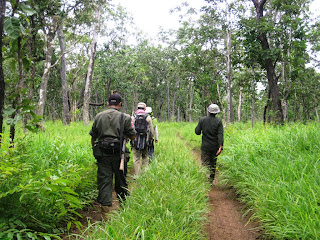After I have become a tiger ambassador, I have experienced two field trips to the tiger territories or habitates. The two trips was done separately; one was in Mondulkiri, Cambodia, and another was was in Vladivostok, Russia in which was support by WWF Russia and WWF Cambodia. First, I went to Mondulkiri Pretected Forest as a part of Eastern Plains Landscape which is located in Mondulkiri province, Cambodia. Another field trip was held in Vladivostok, Russia. On the both trips, I was accompanied by WWF staffs and the rangers in the local areas in Mondulkiri and Vladivostok. I have learned and gained a lot of experiences from these trips. I have noticed that there were many different things between these field trips, but at the same time they shared some things in common.
Evergreen forest in EPL, Mondulkiri, Cambodia
Bamboo forest in EPL, Mondulkiri, Cambodia
Hunting Estate in Vladivostok, Russia
Nature reserve in Vladivostok, Russia
The obvious difference that I could see and feel were the weather and type of forest in both areas. Duing my stay in MPF in Mondulkiri province, the temperature was about 16 degree celsius ,and it was raining almost everyday. We found it hard to find the sunny day in that area. Because of this kind of weather, the forest in that area was green all the time. In contrast to the weather in Mondulkiri province, the weather in Vladivostok of Russia during my field trip was extremely cold. It was about minus 5 degree celsius below zero, and what I could see around me was only white snow and empty leaves trees. The brown trees without leaves made me feel that it was not the real forest even though I was in the middle of the jungle because I was used to the view of forest with the green color like one in Mondulkiri province.
Amur Tiger with the thick fur living in Vladivostok, Russia
Another different is types of animals and the food that the wildlife eat. I could know by comparing the photos the tigers themselves. Subspecie of tiger in Cambodia is Indochinese, while the subspecie of tiger that exist in the forest in Russia is Amur tiger. Since the weather was different, the wildlife which lived in both forest are also different in appearance because they needed to adapt themselves to the surrounding environment. Forexample, the Amur tiger living in Russia has thicker fur than the Indochinese tiger living in Cambodian forest.
Sika Deers, a prey of Amur Tiger in Russia
Wildlife in Far East Russian Forest
The tiger preys species in our forest enjoy eating vine roots or the roots of the trees, while the type of habivores in Russia enjoy eating the seeds, the fruite of Korean pine trees, etc.






